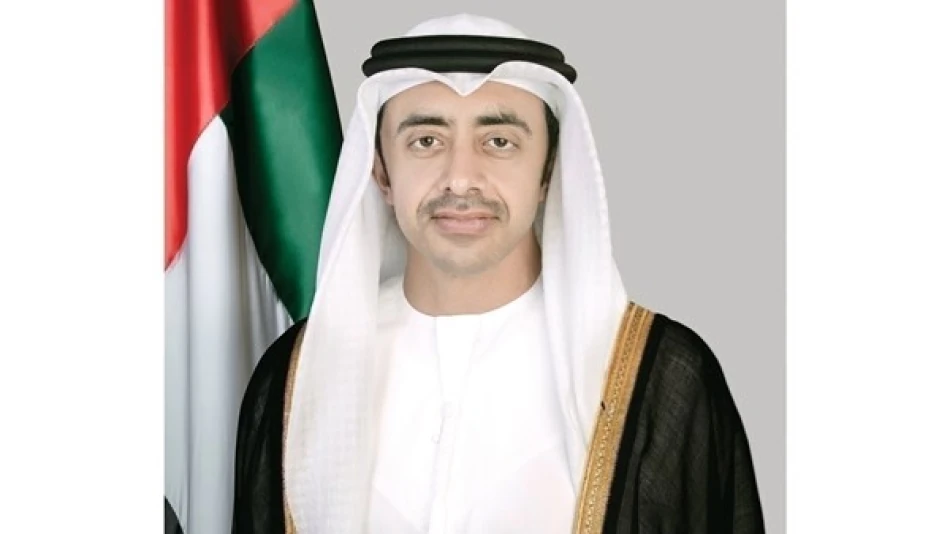
Sheikh Abdullah Celebrates Students as New Academic Year Begins in UAE
UAE Doubles Down on Arabic Language and AI Skills as New School Year Begins
The UAE is positioning itself for a future that balances cultural identity with technological advancement, as Deputy Prime Minister Sheikh Abdullah bin Zayed Al Nahyan outlined ambitious educational priorities for the new academic year. His emphasis on strengthening Arabic language usage while integrating AI skills into curricula signals a strategic approach to preparing Emirati students for a rapidly evolving global economy without losing their cultural roots.
A Dual-Track Educational Strategy
Sheikh Abdullah's message to students and families marks more than ceremonial well-wishes—it reveals the UAE's calculated bet on educational differentiation. While many nations struggle to choose between preserving cultural identity and embracing technological innovation, the Emirates is pursuing both simultaneously.
The minister specifically called for students to use Arabic "at home, school, university, and with friends and colleagues," while simultaneously developing AI skills that have become integrated into the national curriculum. This dual emphasis reflects a broader understanding that future competitiveness requires both cultural authenticity and technological fluency.
The Arabic Language Revival
The UAE's push to strengthen Arabic usage addresses a growing concern across the Gulf region. In cosmopolitan cities like Dubai and Abu Dhabi, where expatriates outnumber locals and English dominates business communications, maintaining Arabic proficiency among young Emiratis has become a national priority.
Beyond Symbolism
This isn't merely about cultural preservation. Research consistently shows that strong native language skills enhance cognitive development and improve learning outcomes in additional languages. For the UAE, ensuring Arabic remains vibrant among its youth represents both cultural continuity and educational best practice.
The timing is strategic. As the UAE positions itself as a regional hub for technology and finance, maintaining a distinct cultural identity becomes both a competitive advantage and a necessity for social cohesion.
AI Integration: Leading the Regional Pack
The UAE's integration of artificial intelligence skills into standard curricula puts it ahead of regional competitors and many developed nations. While countries like the United States and United Kingdom are still debating how to incorporate AI education, the Emirates has moved directly to implementation.
Responsible Innovation
Sheikh Abdullah's emphasis on using AI "with awareness and responsibility" suggests the UAE recognizes both the opportunities and risks of rapid technological adoption. This measured approach contrasts with the often uncritical embrace of new technologies seen elsewhere in the region.
The focus on responsible AI usage positions Emirati students to become thoughtful technology leaders rather than passive consumers—a distinction that could prove crucial as AI reshapes global labor markets.
Family-School Partnership Model
The minister's emphasis on family-school collaboration reflects successful educational models from East Asia and Scandinavia, where strong parent-school partnerships correlate with superior student outcomes. By explicitly positioning parents as "essential partners" in educational success, the UAE is adopting proven strategies while adapting them to local cultural values.
This approach also serves a practical purpose in a rapidly changing society. As the UAE continues its economic diversification away from oil dependence, ensuring educational alignment between home and school becomes critical for maintaining social stability during transition.
Strategic Implications
The UAE's educational priorities reveal a sophisticated understanding of 21st-century competitive dynamics. By strengthening cultural identity while embracing technological innovation, the Emirates is attempting to avoid the cultural displacement that often accompanies rapid modernization.
For investors and businesses, this signals a future workforce that combines cultural authenticity with technological capability—potentially creating unique advantages in sectors requiring both innovation and cultural sensitivity, such as Islamic finance, cultural tourism, and regional business services.
The success of this dual-track approach could establish a model for other Gulf states navigating similar transitions, making the UAE's educational experiment significant far beyond its borders.
Most Viewed News

 Layla Al Mansoori
Layla Al Mansoori






